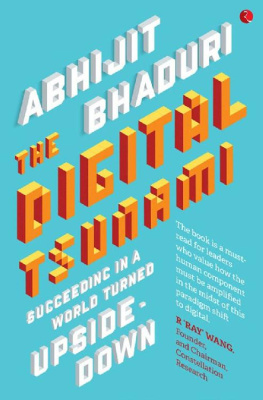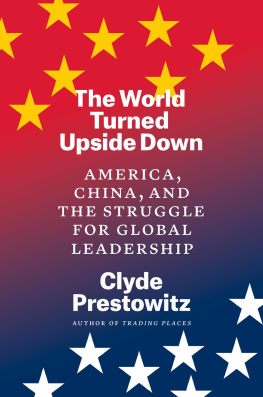Abhijit Bhaduri - The Digital Tsunami: Succeeding in a World Turned Upside-down
Here you can read online Abhijit Bhaduri - The Digital Tsunami: Succeeding in a World Turned Upside-down full text of the book (entire story) in english for free. Download pdf and epub, get meaning, cover and reviews about this ebook. year: 2016, genre: Business. Description of the work, (preface) as well as reviews are available. Best literature library LitArk.com created for fans of good reading and offers a wide selection of genres:
Romance novel
Science fiction
Adventure
Detective
Science
History
Home and family
Prose
Art
Politics
Computer
Non-fiction
Religion
Business
Children
Humor
Choose a favorite category and find really read worthwhile books. Enjoy immersion in the world of imagination, feel the emotions of the characters or learn something new for yourself, make an fascinating discovery.
- Book:The Digital Tsunami: Succeeding in a World Turned Upside-down
- Author:
- Genre:
- Year:2016
- Rating:5 / 5
- Favourites:Add to favourites
- Your mark:
- 100
- 1
- 2
- 3
- 4
- 5
The Digital Tsunami: Succeeding in a World Turned Upside-down: summary, description and annotation
We offer to read an annotation, description, summary or preface (depends on what the author of the book "The Digital Tsunami: Succeeding in a World Turned Upside-down" wrote himself). If you haven't found the necessary information about the book — write in the comments, we will try to find it.
The Digital Tsunami: Succeeding in a World Turned Upside-down — read online for free the complete book (whole text) full work
Below is the text of the book, divided by pages. System saving the place of the last page read, allows you to conveniently read the book "The Digital Tsunami: Succeeding in a World Turned Upside-down" online for free, without having to search again every time where you left off. Put a bookmark, and you can go to the page where you finished reading at any time.
Font size:
Interval:
Bookmark:

Abhijit Bhaduri is seen as an authoritative voice in matters relating to leadership styles, talent management and building a company culture for the digital age. He is the most widely published HR professional from India. He is the Chief Learning Officer at Wipro and one of the top social media influencers in the country. SAP chose him as a Digitalist Thought Leader in 2015. His name also features among the top ten most influential learning professionals in the world. Prior to joining Wipro, Abhijit led HR teams at Microsoft, Pepsi, Colgate and Tata Steel. He is on the advisory board of the prestigious Penn CLO programme of the University of Pennsylvania, United States, and is a member of the governing council of MICA (formerly known as Mudra Institute of Communication and Advertising, Ahmedabad). He has been a speaker at TEDx and at the INK Conference. Abhijit blogs for The Times of India and writes regularly for The Economic Times and People Matters magazine. His writings have appeared in The Wall Street Journal and Forbes.
Join him on Twitter: @AbhijitBhaduri
Email: abhijitbhaduri@live.com
Website: abhijitbhaduri.com

Published by
Rupa Publications India Pvt. Ltd 2016
7/16, Ansari Road, Daryaganj
New Delhi 110002
Copyright Abhijit Bhaduri 2016
The views and opinions expressed in this book are the authors own and the facts are as reported by him/her which have been verified to the extent possible, and the publishers are not in any way liable for the same.
All rights reserved.
No part of this publication may be reproduced, transmitted, or stored in a retrieval system, in any form or by any means, electronic, mechanical, photocopying, recording or otherwise, without the prior permission of the publisher.
ISBN: 978-81-291-4220-7
First impression 2016
10 9 8 7 6 5 4 3 2 1
For sale in the Indian subcontinent only.
This book is sold subject to the condition that it shall not, by way of trade or otherwise, be lent, resold, hired out, or otherwise circulated, without the publishers prior consent, in any form of binding or cover other than that in which it is published.
To
digital dreamers who dream of
a world without boundaries
CONTENTS
FOREWORD
There are few journeys that are as forbidding as those that take us into the unknown. We neither know what to really expect, nor how to respond. This is truly frightening, especially for the modern leadership class that has been honed to sharpness through a collection of analytical approaches and the wisdom of case studies, all of which lead us to the development of a mastery of the uncertain. Alas, the uncertain is of little use in confronting the unknown.
In confronting the uncertain, we are blessed with access to knowledge, numbers and likelihoods that allow us to make judicious, not to say optimal choices based on what we know about the past. While the uncertain is different from what we know, that difference lies in degree, and by applying lessons learned from past uncertain experiences we appreciably raise the likelihood of making a good choice for the future.
With the unknown, however, there is no knowledge, number or likelihood to rely upon. The unknown is unknown. We know not where the future is going, or even if we have the capabilities to get there. There will be new customer expectations, with new players addressing them. There will be new sources of talent, and new rules of the game. All of these are unknown. We cannot predict them or forecast them. Nonetheless, it is in this unknown that the future of most industries is to be found, and as leaders we have to somehow overcome our hesitancy and try to move forward with some degree of grace.
Abhijit Bhaduris choice of the metaphor of a tsunami is an apt one for thinking about addressing a digital future that is both compelling for its promise and frightening for the unknown qualities associated with this promise. We all know that business models, organizations and leadership styles will be profoundly disturbed by the mindsets we will come to associate with our new digital era, but just how they will change and what we will have to do differently in the future is what is so unknown, and the fear associated with all of this is that by the time we figure out what is required, the waves of change are likely to be speeding across the horizon, upsetting the familiar in its path. If we dont quickly take action to get out of its way, we too may become victims of the terrible power of changing tastes and mindsets gone viral.
As the science fiction author William Gibson so famously observed: The future is already here, its just not evenly distributed. When the momentum of change has become so inevitable that its presence is concentrated, then the unknown suddenly becomes clear, and those who are prepared to adjust quickly and coherently are in the best position for survival. So it is with most big changes, and digital transformation may be the biggest big change of all.
As Abhijit has so correctly perceived, The digital world is not about technology. It is about discovering the uniqueness of the human being and technology just becomes an enabler. But what an enabler! The all-pervasiveness of digital enablers in a soon-to-be-here society, that is connected through the Internet of Everything morphing into the Internet of Customer Experiences, is bound to profoundly alter the mindsets of our customers, our value-ecosystem partners, our employees and ultimately ourselves. For us, this means what Abhijit has called design principles of being digital. We, as a team, as an organization, need to develop our work habits so that we are:
1. Borderless thinkers
2. Faster
3. Data-driven and (yet) individualized
4. Talent-centric and obsessed with hiring the right talent.
We can see this all around us. This foreword was written (and rewritten) on three continents (Asia, Europe and North America) over the period of just a few weeksborders are increasingly inconsequential; youve got to be where youve got to be. Fast is the new cadence of modern life; it is what I as a customer expect in any engagement that Im a part of. After all, isnt that what I get normally at home, on the Internet, every day? And, without a doubt, the genomic revolution, unfolding in parallel with the digital revolution, will not only add more data to our lives, but will enable individualized therapeutic responses to that data at the same time. All of this is driving a revolution of expectations; a revolution of mindset, all around us; and the right talent is the one key asset required at the very centre of what will make it work.
But is it reasonable to expect that we will change our offerings, our organizations, our teamwork and yet not ourselves? Of course not! For all of us, no matter what our role or what our industry, the next managerial frontier is me! We too must change profoundly if we wish to keep up with the tsunami waves that are sweeping everything aside. For me, this is the real thin point of the wedge. What are the leadership characteristics that our organizations require (deserve) if we are to move into a continually changing and unknown future that is being fashioned and refashioned by digital experiences? And, of course, how to encourage todays leaders to make a change on becoming tomorrows leader as well? As Abhijit has so accurately perceived, time is short and the consequences are real: A transformation has two characteristicsall the variables change radically, the difference between the former and latter scenarios is radical and the pace of shift is so rapid that it is hard to comprehend the impact of the shift. That is what this book is ultimately all about. And, of course, we need to make such changes at a time when the new rule is that there are no rules.
Next pageFont size:
Interval:
Bookmark:
Similar books «The Digital Tsunami: Succeeding in a World Turned Upside-down»
Look at similar books to The Digital Tsunami: Succeeding in a World Turned Upside-down. We have selected literature similar in name and meaning in the hope of providing readers with more options to find new, interesting, not yet read works.
Discussion, reviews of the book The Digital Tsunami: Succeeding in a World Turned Upside-down and just readers' own opinions. Leave your comments, write what you think about the work, its meaning or the main characters. Specify what exactly you liked and what you didn't like, and why you think so.












